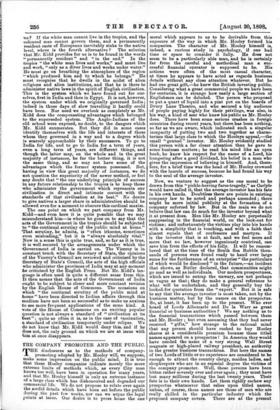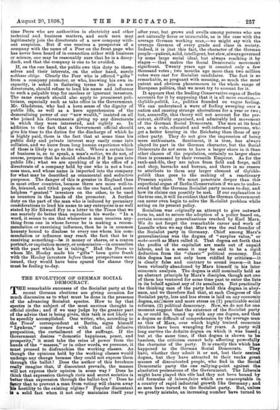i'HE COMPANY PROMOTER AND THE PUBLIC. T HE disclosures as to
the methods of company- promoting adopted by Mr. Hooley will, we suppose, make some impression on the public mind. It is true that these Hooley companies indicate merely the more extreme limits of methods which, as every City man knows too well, have been in operation for many years, and that Mr. Hooley himself is only an extreme instance of a large class which has dishonoured. and degraded. our commercial life. We do not propose to relate over again the .sordid details which have been set before the public during the past few weeks, nor can we argue the legal points at issue. Our desire is to press home the one moral which appears to us to be derivable from this exposure of the way in which Mr. Hooley formed his companies. The character of Mr. Hooley himself is, indeed, a curious study in psychology, if one had time or space to consider it fully. He does not seem to be a particularly able man, and he is certainly far from the careful and methodical man a suc- cessful financial operator is supposed to be. His actions were often of the most casual character, at times he appears to have acted as regards business details without any close attention whatever. But he had one great gift,—he knew the British investing public. Considering what a great commercial people we have been for centuries, it is strange how easily a large section of Englishmen can be deluded. The person who proposed to put a quart of liquid into a pint pot on the boards of Drury Lane Theatre, and who secured a big audience of people paying highly for their privilege, was also, in his way, a kind of seer who knew his public as Mr. Hooley does. There have been some serious crashes in foreign countries during recent years, but there has been nothing, so far as we are aware, which indicated such a singular incapacity of putting two and two together as charac- terises that large class to which the Hooleys appeal,—the small " genteel " investor. Mr. Hooley evidently studied this person with a far closer attention than he gave to some business matters ; he read his mind like an open book, he knew his respect for the name of a Lord, his hungering after a good dividend, his belief in a man who gives the impression of believing in himself. And, there- fore, for a brief time was the head of Mr. Hooley crowned with the laurels of success, because he had found his way to the soul of the average investor.
Now, we venture to suggest as the one moral to be drawn from this "pickle-herring farce-tragedy," as Carlyle would have called it, that the average investor has his fate in his own hands. Doubtless there are points in existing company law to be noted and perhaps amended ; there might be more initial publicity at the formation of a company enforced by law. But in the main we do not believe that law can do much for the investor beyond what it at present does. Men like Mr. Hooley are perpetually reappearing in the financial world, on the look-out for victims ; and unfortunately the victims play into his hands with a simplicity that is touching, and with a faith that almost equals that of confessors and martyrs. It is the investor that is at fault, and we feel more and more that no law, however ingeniously contrived, can save him from the effects of his folly. It will be remem- bered that at the time of the South Sea Bubble thou- sands of persons were found ready to hand over large sums for the furtherance of an enterprise" the particulars of which would be disclosed" in the future,—an incident that shows, as Butler declared, that communities might go mad as well as individuals. Our modern prospectuses, which are issued to entrap the unwary, are not perhaps so vague as that; they do make a general reference to what will be undertaken, and they generally buy the looked-for quotation from the "expert." But it is safe to say that the average investor is most taken, not by the business matter, but by the names on the prospectus. So, at least, it has been up to the present. Who ever heard of Lords Albemarle and De la Warr as great financial or business authorities ? We say nothing as to the financial transactions which passed between them and Mr. Hooley ; but even assuming that they had never received. " gifts," how strange to the rational mind. that any person should have rushed to buy Hooley shares at a considerable premium because these titled names appeared on a prospectus ! In America they would have needed the name of a very strong Wall Street magnate or high-placed railway president, an authority in the greater business transactions. But here the names of two Lords of little or no experience are considered to be enough to attract the country clergy, maiden ladies, and shopkeepers who are in an especial degree the victims of the company promoter. Well, these persons have been bitten rather severely over and over again ; they must have lost many millions during the last twenty years. Their fate is in their own hands. Let them rigidly eschew any prospectus whatsoever that relies upon titled names, unless, of course, these names are those of men who are really skilled in the particular industry which the proposed company covers. There are at the present time Peers who are authorities in electricity and other technical and business matters, and such men may legitimately join the directorate of a new company with- out suspicion. But if one receives a prospectus of a company with the name of a Peer on the front page who has never been heard of in connection either with business or science, one may be reasonably sure that he is a decoy- duck, and that the company is one to be avoided.
If, on the one hand, the public owe this duty to them- selves and their interests, on the other hand, surely noblesse oblige. Clearly the Peer who is offered " gifts " from a company promoter, or who, knowing his own in- capacity, is asked in flattering terms to join a new directorate, should refuse to lend his name and influence to such a palpable trap for careless or ignorant investors. The same remark should also apply to prominent poli- ticians, especially such as take office in the Government. Mr. Gladstone, who had a keen sense of the dignity of public life, as well as a keen apprehension of the demoralising power of our "new wealth," insisted on all who joined his Governments giving up any directorate in which they were interested, and rightly so. In addition to the fact that a Government official should give his time to the duties for the discharge of which he is highly paid, there is the fact that at some time his public duty and private interest may easily come into collision, and we know from long human experience which of these is likely to go to the wall. Where a certain line of business is, so to speak, a man's metier, we do not, of course, propose that he should abandon it if he goes into public life ; what we are speaking of is the office of a directorate of a company held by one who is not a busi- ness man, and whose name is imported into the company for what may be described as ornamental and seductive purposes. The danger of this is greater in England than in most other countries, because there are more well-to- do, leisured, and titled people on the one hand, and more helpless " genteel " investors on the other, to be used as counters in the hands of the promoter. A further duty on the part of the man who is induced by pecuniary considerations to lend his name to any enterprise is so well stated by Sir Edward Fry in a letter to the Times that we can scarcely do better than reproduce his words : "In a word, it seems to me that whenever a man receives any- thing from one in whose favour he is making a recom- mendation or exercising influence, then he is in common honesty bound to disclose to every one whom his com- mendation or influence may reach the fact that he is receiving something—be it money or shares, or a crayon portrait, or capitation money, or commission—in connection with the part which he is taking." Had the Peers to whom Mr. Hooley made his " gifts " been quite frank with the Hooley investors before those prospectuses were issued, they would have been spared the shame they must be feeling to-day.



































 Previous page
Previous page